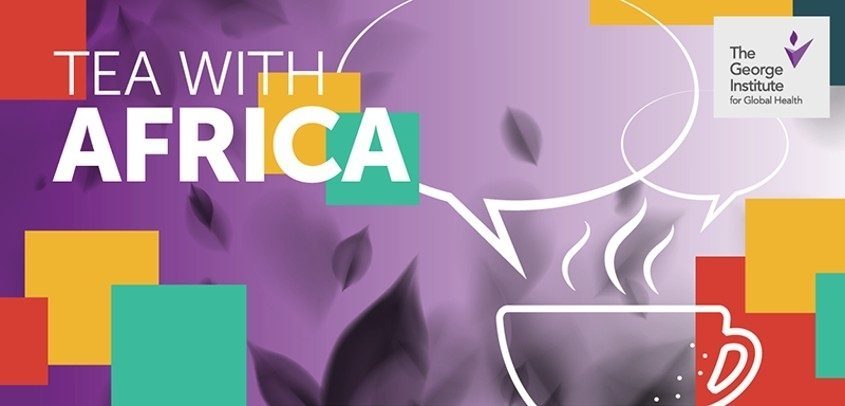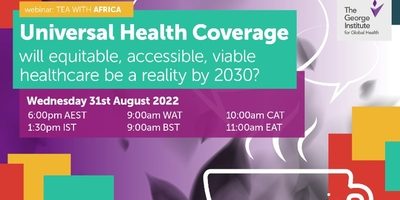
Blog: Key reflections from the Tea with Africa session on “Clinical Trials – Are Global trials truly Global? How can LMICs play a more central role?'
A lot of progress has been made in Africa towards reducing deaths from communicable diseases, and there are opportunities to do the same for non-communicable diseases. Staff and students at The George Institute for Global Health recognise the need for more authentic partnerships with researchers, communities, and institutions in Africa, and the ‘Tea with Africa’ series is part of building these connections.
On 24 May 2022, as part of its Africa Initiative, The George Institute for Global Health hosted the second event in our ‘Tea with Africa’ series. This series is aimed at nurturing global health collaboration and providing an opportunity to showcase thought leadership and policy dialogues from/with experts from African countries.
Our panellists joined us from Uganda, India, and Zimbabwe and attendees joined from countries all over the world. Panellists shared their perspectives on what makes a clinical trial truly global and the challenges that come with them.
Dr. Niveditha Devasenapathy spoke about her experiences with clinical trials in India and the implications that regulatory processes can have on clinical trials. She stated that global trials which are conducted in LMICs focus on the relevance, contribution, and capacity in relation to the LMIC in question. Niveditha is a medical doctor, trained in clinical research and applied statistics with over 15 years of experience in clinical and public health research. She currently leads The Better Treatments program at The George Institute, India office. She is a recipient of the prestigious Department of Biotechnology/Wellcome Trust–India alliance Intermediate Clinical and Public Health fellowship (2020) for the design and evaluation of a technology-based post knee arthroplasty rehabilitation monitoring strategy. She has been involved in the design and analysis of several multicentre randomised controlled trials in maternal health and cardiovascular disease.
Prof. Chiratidzo (Rati) Ndhlovu spoke about regulatory frameworks, community engagement, and funding of clinical trials in Zimbabwe. She stated that Zimbabwe has a strong regulatory framework which can cause delays in approving trials, but it ensures that those that go ahead are of national interest and benefit the community. Rati is an Associate Professor in the Internal Medicine Unit at the University of Zimbabwe Faculty of Medicine and Health Sciences. As a medical educator and clinician involved in Nephrology and HIV Medicine, she has vast experience in internal medicine, renal care as well as having vast experience in looking after HIV patients in a resource-limited setting. She also chairs the National Medicines and Therapeutics Policy Advisory Committee which advises the Permanent Secretary of Health on pharmaceutical issues including selecting medicines for the Zimbabwean Essential Medicines List, as well developing standard treatment guidelines. She has been a long-standing member of the Pharmacovigilance and Clinical Trials Unit (PVCT) at the Medicines Control Authority of Zimbabwe.
Dr. Emmy Okello spoke about the importance of relevant research questions, strengthening trial infrastructure, innovative design and execution, inclusive cohorts, and inclusive dissemination. Emmy is chief of cardiology at the Uganda Heart Institute and honorary associate professor at Makerere University. Okello graduated from Mbarara University School of Medicine and earned his Ph.D. from Makerere University. He received advanced training at Case Western Reserve University through a fellowship of the Medical Education Partnership Initiative (MEPI) - managed by Fogarty and funded by PEPFAR, the NIH Common Fund and the National Heart, Lung and Blood Institute. Dr. Okello has recently led two large clinical trials in Uganda.
The session was chaired by Dr. Olive Kobusingye, an accident & emergency surgeon, injury epidemiologist, and published author. She is Director of the Trauma, Injuries and Disability programme at the Makerere University School of Public Health in Kampala, Board Chair of The Road Traffic Injuries Research Network, and co-founder of The Great Outdoors, Uganda.
Key Reflections:
Addressing the power imbalance between researchers in high income countries and low- and middle-income countries is critical.
Research capacity strengthening, particularly regarding trial design, methodologies, and analysis, should be an inherent aspect of global trials to facilitate an equal contribution by LMIC researchers. The clinical trial community is aware of the gaps in capacity development and know how to conduct trials in an ethical way, the next step is acting on this knowledge. A few examples of how this could be done are as follows:
Research should be incentivised, not just for clinicians but also to nurses, pharmacists, and allied health professionals
Research funding within LMICs should promote early career researchers and enable them to have mentors from HICs
Every global trial with international sponsors should have clearly articulated research capacity strengthening activities
LMIC researchers should not hesitate to ask for more involvement, particularly if they have the knowledge, experience, and capacity to do so
Power imbalance is due to information asymmetry between HIC and LMIC researchers and if we can address information asymmetry power imbalances can be minimised
The requirement to disseminate results from trials to the communities in which they took place vary depending on country, regulatory body, funder, and lead researcher.
Niveditha shared that in India there is no regulatory requirement to make the data openly accessible or to share the trial results with the public. However, all the panellists agreed that disseminating results is an important aspect of any trial and a dissemination plan is often expected during the review process. The presence of information asymmetry is also a contributor to the power imbalances observed between the researchers and participants and/or community, just as seen between HIC researchers and LMIC researchers. If we can address this and allow for a more transparent dissemination of results the balance of power can be improved.
Community engagement is essential to ensure the trials being conducted are of relevance and benefit to the country and community members.
Pre-trial community engagement, including peer groups and consultations with ministries of health/education, is an effective mechanism for participant engagement and retention. In addition to engagement with the community, it can be of benefit to have a regulatory authority that assesses the level of relevance and potential benefit a trial could have to the country, as is the case in Zimbabwe.
From the Discussion:
Q: Is it legally required to register a clinical trial?
Niveditha: Yes, it is a regulatory requirement to register trials with the associated regulatory body.
Rati: In Zimbabwe researchers will be penalised if they do not submit their clinical trials for ethical approvals with the various regulators. They are also required to obtain registration by the apex research council (Research Council of Zimbabwe) which reviews foreign researchers and/or local researchers who are conducting internationally funded research.
Q: What type of community engagement mechanisms are utilised and how have they helped to keep the focus on trials that benefit the community?
Rati: Community advisory boards are often set up to engage with the community. By community, we mean a variety of stakeholders including the potential participants as well as Ministries of Health and/or Education. This process is needed to ensure relevance to the society in which the trial will take place. There is often a requirement to obtain a letter of support from the researchers by the relevant stakeholders before the trial can commence.
Emmy: Regulation authorities will require a letter of support. However, it is important to speak to the community on the ground as well as the higher-level stakeholders to provide education on what the trial is researching and how it will impact their communities.
Niveditha: In India, community engagement is very distant to clinical trials. It is quite common in public health trials, but in a typical clinical trial it is almost non-existent. However, the situation is changing in India, and we have realised how important community engagement and public awareness can help facilitate a trial, especially after our experiences with the COVID trials.
Q: A few countries in Sub-Saharan Africa account for many of the trials in that region. What are the factors affecting trial density within the region? Are the internal or external?
Rati: My assumption would be that it is simply due to the high density of disease (e.g., HIV related disease), most of which are of particular interest to clinical trials.
Emmy: To conduct a trial it requires a high level of capacity that not all countries can accommodate.
Q: A thread that seeks to run through the different elements of global clinical practice guidelines and stages is the power difference. How can one navigate this for example when a trial must be halted? Do adverse events have to be communicated in a situation where the funder is not from an LMIC setting?
Emmy: You do have to report an adverse event, oftentimes within 24 hours.
Niveditha: Halting a trial due to harm is something that IECs should ensure.
Rati: Our various clinical trial review boards expect all adverse events to be reported. The Medical Research Council of Zimbabwe expects serious events, such as death, to be reported within 24 hours. Some research councils will monitor the trials themselves and will not wait for the sponsors, who may be external, to do the trial monitoring. Clinical trials have occasionally been suspended through such internal monitoring processes.
Q: In terms of authorship, most of us are familiar with research teams with most authors being from high-income settings. Do you see a trend towards more representation from African researchers in terms of authorship? If so, what are the features that optimize or favour this? What are the lessons to share for junior researchers?
Rati: External collaborators can often come into the country and work on the trial full time. Those of us who are local often do not have the ability to do this as we are doing research as well as providing patient services. There are also oftentimes an authorship limit and with most of these trials being done at multiple sites, it is the local collaborators/junior research team members that often get left off. We are also left off as we do not fund many of these clinical trials. Our governments should aim to contribute the 1% GDP towards research funding.
Niveditha: We need the capacity, initiative, negotiation power, and the expertise to be in this position. There is a significant need for capacity building in this regard.
Q: Regarding data sovereignty, do communities really have ownership of data from trials?
Niveditha: The research data is owned by the researcher and will be shared with the funder. In India, there is currently no regulatory requirement to share the data with the community.
Olive: My experience is that sometimes a lack of capacity is used as an excuse by HIC institutions to make it difficult for LMIC institutions to have real ownership of the data. They set up systems that facilitate data entry to HIC institution servers, and access for LMIC might be a challenge. It also means that the analysis is largely in the hands of the HIC partner, to the disadvantage of the LMIC partner. Sometimes these conditions are written in the grant agreement, and because the LMIC colleagues are doing all they can to get funding, they are compelled to agree to these unfair terms. LMIC IRBs should not allow such agreements to be signed.
Rati: We are trying to ensure that we have intellectual property policies in place, but we generally do not have the capacity to “hold” the data in country and hence most of this data is held offshore. We also have a limited capacity to handle the data analysis when it comes to biostatisticians. That also leads to the data being analysed in the HIC settings. Those few biostatisticians that have been trained are oftentimes lost to “brain drain”.




